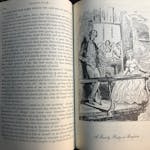Erika Sánchez's debut novel for young adults, "I Am Not Your Perfect Mexican Daughter," offered a fictional account of the constraints of growing up in a poor immigrant family in Chicago. Sánchez's latest, "Crying in the Bathroom," a memoir in essays, grows out of the same need to address crushing family circumstances of poverty and limiting gender norms. Blazingly honest and gloriously raucous, the memoir is about the author's struggle to forge a life of her choosing without viable role models. It's no surprise that mistakes feature prominently in the book.
The opening essay in the collection titled "The Year My Vagina Broke" is a provocative account of Sánchez's affliction from a vaginal infection in her senior year of college. "Men came and went, but the infection persisted," she writes, with disarming candor. Here is the author, now the Sor Juana Inés de la Cruz Chair in the Latin American and Latin Studies department at DePaul University, being examined by a motley crew of doctors, nurses and acupuncturists, but none has a diagnosis for her aching vulva.
Is Sánchez joking? In the essay titled "Down to Clown," she addresses how humor is a coping mechanism for those who stand on the margins. Sánchez's intention is to tell the truth about difficult experiences, even if it sounds unseemly.
Deeper themes come to the surface as the essays unfurl. The author's reflections cast light on a generation of recent immigrants who have rebelled against their adverse circumstances, their parents and the parents' values. With the rebellion, however, comes a sense of existential malaise, a psychic wound.
At its heart, the memoir is the author's reckoning with trauma: a gaping hole of nothingness. "I've tried to fill it with everything I could: sex, men, cigarettes, alcohol, travel, food, and generally living recklessly, often harming my body in the process, but these selves were only temporary. These selves were not selves at all," she writes.
Sánchez addresses, unapologetically, her sexuality, failed relationships, solo travels, conversion to Nichiren Buddhism, family and other topics. Readers will recognize echoes of Sandra Cisneros' memoir "A House of My Own: Stories From My Life." Yet Sánchez speaks to the reader in bold terms that are her own.
A particularly arresting essay in the collection titled "Difficult Sun" is about an abortion the author underwent and its devastating effect on her mental health. The experience of coming out of the long depression that followed was for her akin to being reborn. The book ends with a moving letter from Sánchez to her newborn daughter, Sojourner.
"Crying in the Bathroom" is also an artist statement. Watching flamenco dancers in Madrid during a yearlong trip on a Fulbright scholarship set Sánchez on the journey to recovery from depression. The anguished look on the dancers' faces taught her that perhaps the wound never healed. The burden was to make beauty out of pain.
There's no quick cauterizing of the wound in this memoir. What Sánchez accomplishes here so well is to offer herself as an uncommon role model for others finding their way. This book is a great gift of hope.
Sharmila Mukherjee's writing has been published in the Washington Post, NPR, Los Angeles Review of Books and elsewhere. She is a lecturer in English at the University of Washington, Seattle.
Crying in the Bathroom
By: Erika Sánchez.
Publisher: Viking, 256 pages, $27.






